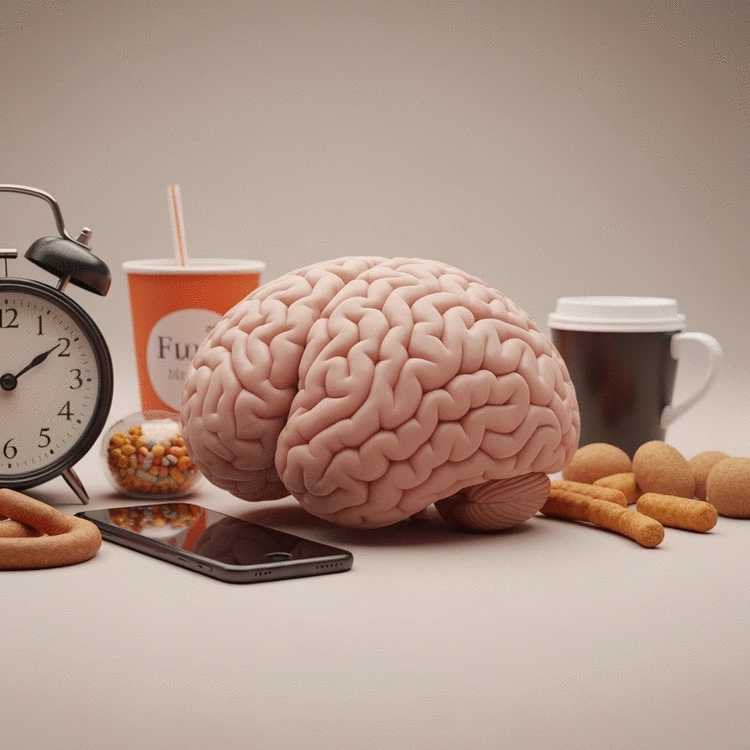What if your daily habits could either sharpen or dull your brain's performance? Understanding the link between these habits and brain health can empower you to make better choices for your cognitive well-being.
What You Will Learn
- *Brain health is crucial for enhancing productivity, mood regulation, and personal relationships.*
- *Common myths about brain damage include the belief that it only occurs in older adults or from genetic factors.*
- *Emotional intelligence significantly impacts cognitive function, leading to improved decision-making and relationships.*
- *Chronic sleep deprivation and a sedentary lifestyle are two of the seven most damaging habits affecting brain function.*
- *Improving brain health can start with prioritizing sleep, staying active, and making healthy dietary choices.*
- *Mental health and brain function are closely intertwined; reducing stress can enhance cognitive abilities.*
The 7 Most Damaging Habits Affecting Brain Health
Understanding these habits is the first step towards improving cognitive vitality. Below is a summary of the key detrimental habits and their impact.
Chronic Sleep Deprivation
Lack of sleep can severely affect memory and decision-making capabilities.
Sedentary Lifestyle
Being inactive is linked to cognitive decline and reduced brain function over time.
Poor Dietary Choices
Unhealthy foods can lead to neurotoxicity and negatively affect brain function.
Excessive Screen Time
Too much time in front of screens can cloud mental clarity and focus.
Chronic Stress
High stress levels often result in memory loss and various cognitive issues.
Social Isolation
Feeling disconnected from others can lead to diminished cognitive abilities.
Substance Abuse
Using drugs or alcohol can have severe and long-term negative effects on brain health.
Understanding the Impact of Habits on Brain Health
Our brain is the command center of our body, influencing everything from our emotions to our decision-making. Yet, many of us might not realize the profound impact our daily habits have on our brain health. Understanding this relationship is crucial for improving not just mental function, but overall well-being.
At The Stone Builders Rejected, we believe that fostering a conversation about brain health is essential. By discussing how habits shape our cognitive abilities, we can empower each other to make informed choices. So, let's dive into why brain health is so vital for our lives!

Why Brain Health is Crucial for Overall Well-Being
An optimally functioning brain leads to enhanced productivity, better mood regulation, and stronger relationships. When our brain health declines, it can affect various aspects of our lives, from our performance at work to our emotional stability. Research from the National Institutes of Health highlights that maintaining good brain health is key to preserving cognitive function as we age and can significantly impact our overall quality of life.
- Improved memory retention
- Enhanced problem-solving skills
- Greater emotional resilience
These benefits showcase how investing time in maintaining our brain health can lead to a more fulfilling life. Each of us can take actionable steps to ensure our brains remain sharp and healthy!
Common Misconceptions About Brain Damage and Lifestyle
Many people believe that brain damage only occurs from severe injuries or neurological diseases. However, lifestyle choices can significantly contribute to cognitive decline over time. It's essential to challenge these misconceptions. The Mayo Clinic emphasizes that brain health is influenced by habits and lifestyle, not just genetics or age.
- Myth: Only older adults experience cognitive decline.
- Myth: Brain health is solely determined by genetics.
- Myth: You can't reverse brain damage.
Understanding these myths allows us to recognize the importance of our daily habits in maintaining cognitive functions. By debunking these common misconceptions, we can foster a healthier dialogue around brain health.
The Role of Emotional Intelligence in Maintaining Brain Health
Emotional intelligence (EQ) plays a crucial role in our overall brain health. It involves recognizing, understanding, and managing our emotions effectively, which can positively affect our cognitive functions.
- High EQ can lead to improved relationships.
- It enhances decision-making abilities.
- It promotes better stress management.
By nurturing our emotional intelligence, we create a positive feedback loop that supports our brain health. I often reflect on how emotional interactions shape our mental landscapes, and I encourage you to consider your emotional wellness as part of your overall cognitive health strategy!
The 7 Most Damaging Habits That Hurt Your Brain
While understanding the importance of brain health is vital, identifying harmful habits is equally essential. So, let's explore the seven most damaging habits that can negatively impact your brain function!
Interactive Poll: Your Thoughts on Brain Health
How do you prioritize your brain health in your daily routine? Share your approach below:

Frequently Asked Questions About Brain Health and Habits
What are the main habits that negatively impact brain health?
The primary damaging habits include chronic sleep deprivation, a sedentary lifestyle, poor dietary choices, excessive screen time, chronic stress, social isolation, and substance abuse.
Why is brain health so crucial for overall well-being?
Optimal brain health leads to enhanced productivity, better mood regulation, stronger relationships, improved memory retention, enhanced problem-solving skills, and greater emotional resilience, all of which contribute to a more fulfilling life.
Can lifestyle choices really affect brain health, or is it mostly genetics?
While genetics play a role, lifestyle choices significantly impact brain health. There are common misconceptions that cognitive decline only affects older adults or is solely genetic. Our daily habits are powerful determinants of our cognitive functions.
How does emotional intelligence relate to brain function?
Emotional intelligence (EQ) helps in recognizing, understanding, and managing emotions effectively. High EQ can lead to improved relationships, enhanced decision-making abilities, and better stress management, all of which positively support brain health and cognitive functions.
What steps can I take to improve my brain health?
Practical steps include prioritizing 7-9 hours of quality sleep, engaging in regular physical activity, making healthy eating choices (fruits, vegetables, whole grains), limiting screen time, practicing stress management techniques (like meditation or yoga), maintaining social connections, and staying informed about the effects of substance abuse. More insights on bad habits for the brain can be found on DAP Health.
Key Takeaways on Protecting Your Brain Health
As we navigate the complexities of life, understanding the importance of brain health becomes essential. Our cognitive function can be significantly impacted by our daily habits. Here's a quick recap of the 7 damaging habits that can hurt your brain:
- Chronic Sleep Deprivation: Lack of sleep can severely affect memory and decision-making.
- Sedentary Lifestyle: Being inactive is linked to cognitive decline over time.
- Poor Dietary Choices: Eating unhealthy foods can lead to neurotoxicity and affect brain function.
- Excessive Screen Time: Too much time in front of screens can cloud mental clarity.
- Chronic Stress: High stress levels often result in memory loss and cognitive issues.
- Social Isolation: Feeling disconnected can diminish cognitive abilities.
- Substance Abuse: Using drugs or alcohol can have long-term negative effects on brain health.
By being aware of these habits, we can take proactive steps toward enhancing our cognitive vitality!
Encouraging Action: Steps to Take for Better Brain Health
It’s never too late to start taking action for your brain health! Here are some practical steps you can implement:
- Prioritize Sleep: Aim for 7-9 hours of quality sleep each night.
- Stay Active: Engage in regular physical activity to boost brain function.
- Make Healthy Eating Choices: Incorporate more fruits, vegetables, and whole grains into your diet.
- Limit Screen Time: Establish boundaries for how much time you spend on devices.
- Practice Stress Management: Use techniques like meditation or yoga to alleviate stress.
- Connect with Others: Maintain social connections to enhance cognitive health.
- Stay Informed: Educate yourself about substance abuse and its effects.
Taking these steps can lead you towards a healthier brain and improved overall wellness. Remember, even small changes can make a big difference!
Exploring the Relationship Between Mental Health and Brain Function
Mental health is closely intertwined with brain function. When we take care of our mental well-being, it has a ripple effect on our cognitive abilities. For instance, reducing stress through mindfulness practices not only improves your mood but can also enhance your memory and focus.
- Emotional Health: Positive emotions can encourage neuroplasticity, allowing the brain to adapt and grow.
- Stress Management: Lowering anxiety levels can help protect your brain from memory-related issues.
- Social Engagement: Interactions with others can boost your mood and cognitive function simultaneously.
So, as we focus on brain health, let’s not forget the vital connection to our emotional well-being. At The Stone Builders Rejected, we believe that sharing knowledge about these connections is crucial in fostering a healthier community! Together, we can champion better brain health and mental wellness.
Recap of Key Points
Here is a quick recap of the important points discussed in the article:
- Brain Health Importance: Maintaining brain health is crucial for improved memory, enhanced problem-solving skills, and greater emotional resilience.
- Debunking Myths: Cognitive decline can affect individuals of all ages and is not solely determined by genetics.
- Emotional Intelligence: High emotional intelligence enhances decision-making and promotes better stress management.
- 7 Damaging Habits: Chronic sleep deprivation, a sedentary lifestyle, poor dietary choices, excessive screen time, chronic stress, social isolation, and substance abuse can harm brain function.
- Practical Steps: Prioritizing sleep, engaging in physical activity, making healthy food choices, and managing stress can enhance brain health.
- Mental and Emotional Health Connection: Caring for mental well-being positively impacts cognitive abilities and overall brain function.






